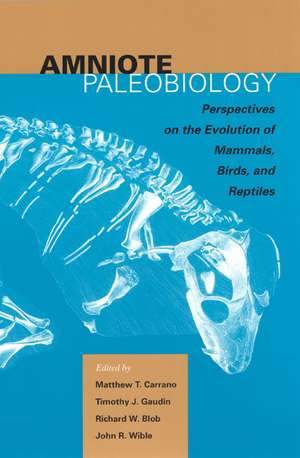Amniote Paleobiology: Perspectives on the Evolution of Mammals, Birds, and Reptiles
Editat de Matthew T. Carrano, Richard W. Blob, Timothy J. Gaudin, John R. Wibleen Limba Engleză Paperback – 31 iul 2006
Living amniotes—including all mammals, birds, crocodilians, snakes, and turtles—comprise an extraordinarily varied array of more than 21,000 species. Found in every major habitat on earth, they possess a truly remarkable range of morphological, ecological, and behavioral adaptations. The fossil record of amniotes extends back three hundred million years and reveals much about modern biological diversity of form and function.
A collaborative effort of twenty-four researchers, Amniote Paleobiology presents thirteen new and important scientific perspectives on the evolution and biology of this familiar group. It includes new discoveries of dinosaurs and primitive relatives of mammals; studies of mammalian chewing and locomotion; and examinations of the evolutionary process in plesiosaurs, mammals, and dinosaurs. Emphasizing the rich variety of analytical techniques available to vertebrate paleontologists—from traditional description to multivariate morphometrics and complex three-dimensional kinematics—Amniote Paleobiology seeks to understand how species are related to each other and what these relationships reveal about changes in anatomy and function over time. A timely synthesis of modern contributions to the field of evolutionary studies, Amniote Paleobiology furthers our understanding of this diverse group.
A collaborative effort of twenty-four researchers, Amniote Paleobiology presents thirteen new and important scientific perspectives on the evolution and biology of this familiar group. It includes new discoveries of dinosaurs and primitive relatives of mammals; studies of mammalian chewing and locomotion; and examinations of the evolutionary process in plesiosaurs, mammals, and dinosaurs. Emphasizing the rich variety of analytical techniques available to vertebrate paleontologists—from traditional description to multivariate morphometrics and complex three-dimensional kinematics—Amniote Paleobiology seeks to understand how species are related to each other and what these relationships reveal about changes in anatomy and function over time. A timely synthesis of modern contributions to the field of evolutionary studies, Amniote Paleobiology furthers our understanding of this diverse group.
Preț: 456.77 lei
Nou
Puncte Express: 685
Preț estimativ în valută:
87.41€ • 90.30$ • 72.75£
87.41€ • 90.30$ • 72.75£
Carte tipărită la comandă
Livrare economică 25 martie-08 aprilie
Preluare comenzi: 021 569.72.76
Specificații
ISBN-13: 9780226094786
ISBN-10: 0226094782
Pagini: 448
Ilustrații: 37 halftones, 86 line drawings, 47 tables
Dimensiuni: 152 x 229 x 30 mm
Greutate: 0.9 kg
Editura: University of Chicago Press
Colecția University of Chicago Press
ISBN-10: 0226094782
Pagini: 448
Ilustrații: 37 halftones, 86 line drawings, 47 tables
Dimensiuni: 152 x 229 x 30 mm
Greutate: 0.9 kg
Editura: University of Chicago Press
Colecția University of Chicago Press
Notă biografică
Matthew Carrano is curator of dinosaurs in the Department of Paleobiology at the Smithsonian Institution. Timothy Gaudin is associate professor in the Department of Biological and Environmental Sciences at the University of Tennessee at Chattanooga. Richard Blob is assistant professor in the Department of Biological Sciences at Clemson University. John Wible is curator of mammals at the Carnegie Museum of Natural History.
Cuprins
1. Introduction
Part One: New Fossils and Phylogenies
2. The Mandible of Whatcheeria deltae, an Early Tetrapod from the Late Mississippian of Iowa
3. Theropod Dinosaurs from the Early Jurassic of Huizachal Canyon, Mexico
4. Herpetoskylax hopsoni, a New Biarmosuchian (Therapsida: Biarmosuchia) from the Beaufort Group of South Africa
5. The Postcranial Skeleton of Kayentatherium wellsi from the Lower Jurassic Kayenta formation of Arizona and the Phylogenetic Significance of Postcranial Features in Tritylodontid Cynodonts
6. The Phylogeny of Living and Extinct Armadillos (Mammalia, Xenartha, Cingulata): A Craniodental Analysis
Part Two: Large Scale Evolutionary Patterns
7. The Origins of High Browsing and the Effects of Phylogeny and Scaling on Neck Length in Sauropodomorphs
8. Body-Size Evolution in the Dinosauria
9. Major Changes in the Ear Region and Basicranium of Early Mammals
Part Three: Functional Morphology
10. Shoulder Girdle and Forelimb Multituberculates: Evolution of Parasagittal Forelimb Posture in Mammals
11. Tooth Orientation during Occlusion and the Functional Significance of Condylar Translation in Primates and Herbivores
Part Four: Ontogeny and Evolution
12. Neoteny and the Plesiomorphic Condition of Plesiosaur Basicranium
13. Scaling of the Hind Limb skeleton in Cynognathian Cynodonts: Implications for Ontogeny and the Evolution of Mammalian Endothermy
14. Cranial Variability, Ontogeny, and Taxonomy of Lystrosaurus from the Karoo Basin of South Africa
Part Five: Reflections on James Allen Hopson
15. James Allen Hopson: A Biography
Appendix. James Allen Hopson: A Bibliography (1964-2005)
Contributors
Subject Index
Taxonomic Index
Part One: New Fossils and Phylogenies
2. The Mandible of Whatcheeria deltae, an Early Tetrapod from the Late Mississippian of Iowa
3. Theropod Dinosaurs from the Early Jurassic of Huizachal Canyon, Mexico
4. Herpetoskylax hopsoni, a New Biarmosuchian (Therapsida: Biarmosuchia) from the Beaufort Group of South Africa
5. The Postcranial Skeleton of Kayentatherium wellsi from the Lower Jurassic Kayenta formation of Arizona and the Phylogenetic Significance of Postcranial Features in Tritylodontid Cynodonts
6. The Phylogeny of Living and Extinct Armadillos (Mammalia, Xenartha, Cingulata): A Craniodental Analysis
Part Two: Large Scale Evolutionary Patterns
7. The Origins of High Browsing and the Effects of Phylogeny and Scaling on Neck Length in Sauropodomorphs
8. Body-Size Evolution in the Dinosauria
9. Major Changes in the Ear Region and Basicranium of Early Mammals
Part Three: Functional Morphology
10. Shoulder Girdle and Forelimb Multituberculates: Evolution of Parasagittal Forelimb Posture in Mammals
11. Tooth Orientation during Occlusion and the Functional Significance of Condylar Translation in Primates and Herbivores
Part Four: Ontogeny and Evolution
12. Neoteny and the Plesiomorphic Condition of Plesiosaur Basicranium
13. Scaling of the Hind Limb skeleton in Cynognathian Cynodonts: Implications for Ontogeny and the Evolution of Mammalian Endothermy
14. Cranial Variability, Ontogeny, and Taxonomy of Lystrosaurus from the Karoo Basin of South Africa
Part Five: Reflections on James Allen Hopson
15. James Allen Hopson: A Biography
Appendix. James Allen Hopson: A Bibliography (1964-2005)
Contributors
Subject Index
Taxonomic Index
